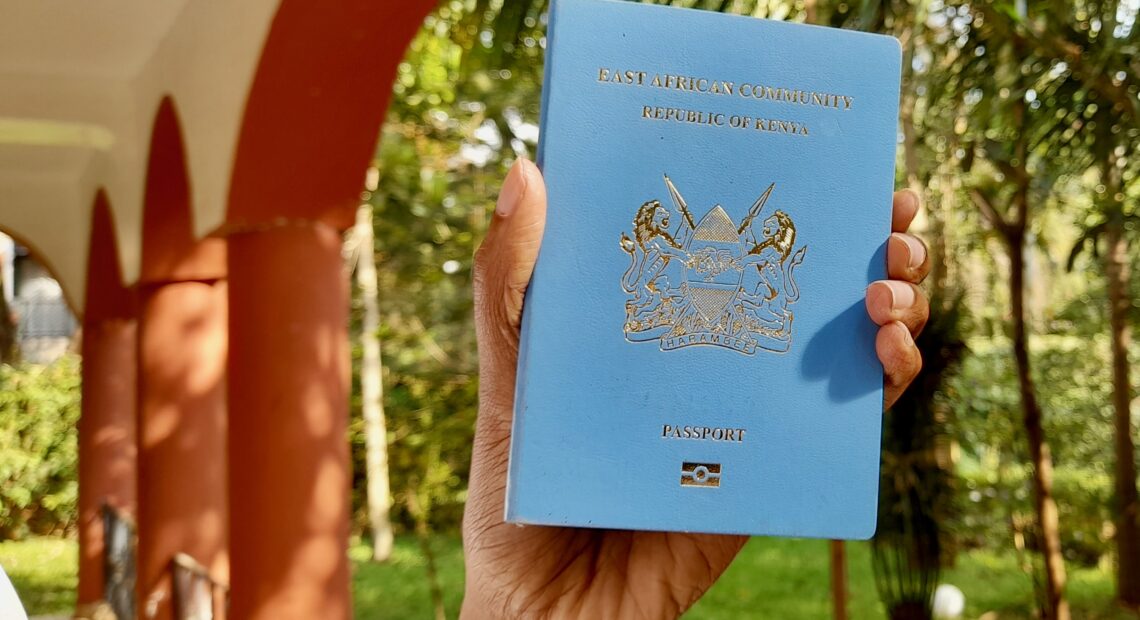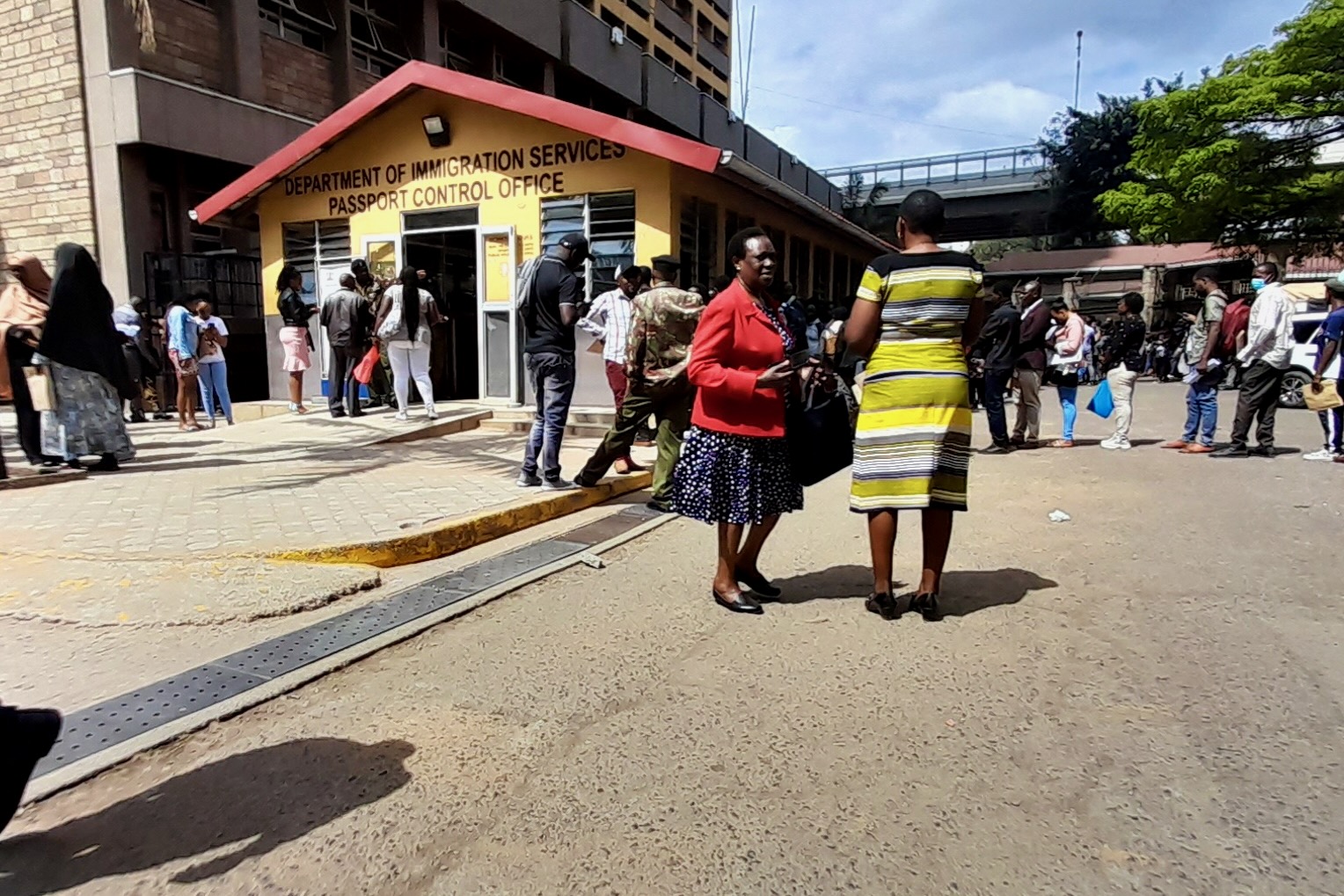Kenya | No alternatives

Ngina Kirori
On Christmas Day in 2019, at her wits end after failing for long periods to put enough food on the table at home, Faith Murunga left Kakamega, her rural area in Kenya, with an “agent” who offered her a domestic worker job in Saudi Arabia. “I simply could not bear to see my children going without food. A friend told me about the opportunity and connected me to the agent. The deal was that I would be paid 30,000 shillings (US$214) monthly, with health benefits.” She packed her bags, said difficult goodbyes to her six children and husband, and boarded the agent’s taxi.
She had taken the step with some trepidation; stories of the abuses suffered by African domestic workers in the Gulf states were all too well known in Kenya. “But I was desperate. And I thought that my story might be different,” she says.
It wasn’t.
I simply could not bear to see my children going without food
After a three day trip, arriving at her new place of work in Saudi Arabia, a household of a man and wife couple, she “immediately felt hostility,” she says. “I was put to work without a chance to rest and I was constantly being yelled at. I was expected to do multiple tasks at once such as washing the clothes and ironing at the same time. I was denied food when I was unable to keep up, and when I did get food, it was leftovers of what they had eaten. I was also made to do odd personal tasks such as applying medication on one of my employer’s backsides. Worse still, was that my salary ended up being 23,000 Kenya shillings
(US$164) and I did not receive health benefits. I had been duped, but I endured so I could send money back home to my family.”
Slaps and kicks
However, in May 2021, after the yells became slaps and kicks, Murunga fled to a police station to report the abuse. Once there, a police officer called her employer and “told the two of us to talk it out.” Upon his arrival, the man promised the police that it would never happen again, after which the police directed him to take her back. But things “got nasty,” she says, when they got home. She was beaten to the floor, her back was stepped on by the man, and she was told she would not leave until she finished her two year contract because “they had already paid too much money for her.”

People wait outside the immigration office to process their documents and passport applications. Photo by Ngina Kirori
Her employers had confiscated Murunga’s passport and her two phones upon arrival, but she had secretly kept one small phone. One day, hiding in the kitchen, she was typing a message to her husband about the abuse when her employer caught her again. “He was livid. He pulled me to the stove, took the kettle with hot water, and poured it on my arm. He forced me to phone my husband and tell him to retract the messages, or he would not take me to the hospital. I did that because the pain was severe, but he still did not take me there. The next day, he sent me to take the trash outside, and I fled.”
At another police station, where the burns on her arm made an impression, the police called in the Red Cross, which in turn helped her get to a hospital. Through that contact, finally, a chain of people, including NGOs, came to her assistance. They helped fund her air ticket and passport to bring her back home.
Just sleep with your boss,” the embassy official said
Even though the Kenyan authorities had been alerted by Murunga’s husband, and had told him that they had contacted their offices in Saudi Arabia, the Kenyan embassy there had been of no help. “I phoned them myself,” she says. “But the official who answered the phone told me that I am a woman and I should go do the work of prostitution that other women do, so that I can keep my job. He told me to just sleep with my boss.”
Raising awareness
Against all odds, even after coming back home and finding that her husband had “misused all the money I had been sending him, had taken in another woman, and had sent the children to live in different relatives’ homes”, Murunga’s story has ended well. NGOs helped put her back on her feet, she secured a job for herself at a human rights organisation, and is now one of two former Gulf victims who campaign to raise awareness in Kenya about to the risks of travelling there for work. According to Kenyan government statistics, 89 dead bodies of Kenyans were transported back from the Gulf between 2019 and 2021, with their employers reporting that they had died from cardiac arrest, suicide, or had “died in their sleep” https://www.context.news/money-power-people/after-maids-die-in-saudi-arabia-kenyan-relatives-sound-alarm.
It’s like telling a child not to put its hand in the fire
“But it’s like telling a child not to put its hand in the fire, it goes and puts its hand in the fire,” says fellow returnee, Patricia Wanja Kimani, whose experiences were recorded in a book titled Greener pastures in the desert. Kimani admits to feeling disheartened, not only because her story doesn’t seem to have done much to deter the many Kenyans who are still going to the Gulf, but also because she knows that – like in her own experience – there are few alternatives for the overwhelming majority of the youth and the poor in Kenya. According to the Kenyan Federation of Employers, 67 percent of youths between 15 and 34 cannot find jobs in the country https://www.fke-kenya.org/policy-issues/youth-employment, where an already-large wealth gap between the majority and the ruling political establishment is continuing to grow.
A street poll whereby ten young Kenyans were asked if they would consider going to the Gulf states to work resulted in four yeses, two maybes, and only four “under no circumstances” responses. All the respondents had heard of the abuses in Saudi Arabia and the other Gulf states.
It is estimated that up to 300,000 Kenyan citizens work in the Gulf states on temporary contracts, with women mostly employed as domestic workers and cleaners, and men as porters, drivers, security guards, and construction workers. There haven’t been any surveys to indicate what percentage of these labour migrants work in slave-like conditions, or how many are (especially in the case of the women employed in households) beaten or raped, but from word-of-mouth in Kenya, Gulf employers are widely seen as both racist and abusive (1). And while some employers might be less violent, the NGOs have also noted a practice of “selling off” domestic workers in the Gulf, where an initial household sells the woman to lower income families “which have a more negative perception of black people.” This more negative perception often leads to more abuse, she explains: “They hurl insults at the women and tell them they have ‘bought them’.”
Brain drain
Blue collar work is not the only driver of migration away from Kenya; doctors and engineers are leaving the country in increasing numbers too; in their case often legally, since their skills are coveted abroad. The Kenyan government recently announced policies to improve the working conditions of both doctors https://www.theafricareport.com/300017/kenya-taming-medical-brain-drain-by-curbing-emigration/ and engineers https://www.the-star.co.ke/news/realtime/2023-03-05-welfare-issues-leading-to-brain-drain-among-engineers-ps/, but none of these policies had noticeably begun to materialise at the time of this report’s publication.
Poor responses
Civil society groups have accused the Kenyan government of a lackadaisical attitude when it comes to their citizens in the Gulf. Chairman Francis Atwoli of the Central Organisation of Trade Unions (COTU) recently publicly accused Kenya’s Ministry of Labour of “ignoring the plight of migrant workers.” Spokesman Fred Ojiro of the human rights NGO Haki says in an interview that “the Ministry of Foreign Affairs is not looking at the (…) human trafficking, and we believe that the bilateral agreements (between Kenya and Gulf states) also need to be looked at. We have reported these issues to the Ministry of Foreign affairs, but we have received poor responses.”
Critics say the government should check on the many Gulf labour recruitment agencies in Kenya who “swindle people” – in the words of Faith Murunga – taking fees from US$300 to US$1,200 to organise the trip, then abandoning migrant labourers after they are taken to their employers, who often confiscate their passports and phones. Kenya’s National Employment Authority, the relevant agency within the Ministry of Labour, has blamed “rogue agencies”, saying that only 40 percent of such businesses properly registered with it in 2022, but has not been perceived to take effective action to close down these “rogues”.
A lucrative business
According to government statistics, 80,000 Kenyans travelled to Gulf nations and the Middle East in 2022, each paying fees ranging from US$300 to US$1,200 to either “rogue” or registered recruitment agencies, depending on the agency and the specific Gulf country involved https://www.business-humanrights.org/en/latest-news/huge-recruitment-fees-charged-for-jobs-in-the-gulf-qatar-recruiters-accused-of-demanding-the-highest-commissions/. This means that, at the very lowest estimate, around US$24 million was paid by migrants for their own travel out of Kenya in that year. Once employed in the Gulf, the workers then send part of their salaries home. According to recent figures, migrant labourers delivered US$187 million to the Kenyan economy from Saudi Arabia in the first eight months of 2022 alone
https://www.theeastafrican.co.ke/tea/business/saudi-remittances-double-3959522. Overall diaspora remittances from abroad to Kenya amounted to over US$4 billion in that year.
Yet another source of income for the Kenyan government comes from passport fees. With the daily issuance of passports recently increased from 1,500 to 5,000 per day, at a US$31 fee each, this amounts to a turnover of US$155,000 every day.
In an interview with ZAM, Permanent Secretary of Foreign Affairs Roseline Njogu, who is in charge of the Ministry’s Diaspora Office, blamed migrants themselves for following “unofficial channels” to seek jobs in the Gulf. She appeared irked at the fact that complaints about abusive conditions in the Gulf had been raised on traditional and social media, saying that abuse victims should use the Ministry’s dedicated “hotline, not to mention our email which is regularly monitored for complaints.” When asked what victims whose phones have been taken away should do, Njogu pointed out that there are “rescue centres” at different points in Saudi Arabia; that she had visited the one in Ryadh, where 257 women currently reside, earlier this year; and that her office “has brought home many distressed domestic workers, funding everything including air tickets.”
The Permanent Secretary referred to a hotline
She also insisted that the situation had improved in recent years, partly as a result of an electronic platform based in Saudi Arabia called “Musaned”, which keeps track of the contracts signed between employers and employees, both in English and Arabic. “Another improvement is the Bilateral Labour Agreement which facilitates the return of any Kenyan, should mistreatment occur,” Njogu said.
The NGOs, however, maintain that these “improvements” mostly exist on paper only. Only a small fraction of women thought to be labouring in abusive conditions ever seem to make it to the shelters; 288 at the last official count, in 13 centres. Those who do get there “are (then) stuck there for years because of documentation issues and other problems,” says Patricia Kimani. Haki’s Fred Ojiro adds that healthcare in these centres is lacking. “In fact, in the second week of June, one woman died while she was there.” According to other reports, several other women have also succumbed to illnesses.
A civil rights activist who asked to remain anonymous criticised the government for putting the blame on women who go to the Gulf for “not following protocol” instead of holding the relevant Gulf authorities accountable. “When it has been proven that all the procedures were followed, mistreatment still occurred.”
Since the practical implementation of employment policies and programmes rests with the National Employment Authority, which reports to the Ministry of Labour, ZAM asked it for its plans to address the unemployment and poverty scourges that drive Kenyans away. A representative of the Ministry who answered the phone transferred our call to the Director-General’s office, which directed ZAM to send an email, which we did. The agency acknowledged receipt of the email but did not respond to the queries.
State involvement
Patricia Kimani suspects that the lack of action by some government officials to address the situation both within and outside of Kenya may be connected to their involvement in the lucrative (see box) labour trafficking. “Honestly, some government officials and civil servants are enablers. I was once threatened for going public about the abuse I suffered, and the person in question told me that a certain government official was on their side. Other women have also told me that they were given ‘orders from above’ to drop charges whenever they spoke out.”
Women were given ‘orders from above’ to drop charges
The US State Department stated in a 2022 report https://www.state.gov/reports/2023-trafficking-in-persons-report/kenya/ that trafficking syndicates – presumably operating through the aforementioned “rogue” recruitment agencies – in Kenya “colluded with various law enforcement and immigration departments, including those at border checkpoints and airports, to transport trafficking victims,” leading to “serious and sustained concerns of official complicity in trafficking crimes, which hindered both law enforcement efforts and victim identification.” It added that “the government did not report any law enforcement action against allegedly complicit officials.”
The Finland scandal
“Blue collar” traffic to Gulf States is not the only cash cow for those involved. A programme for studying abroad, in Finland and Canada respectively, advertised from May 2021 to January 2023 by Kenya’s Uasin Gishu County senator Jackson Mandago and two fellow politicians, yielded the group over 33 million Kenyan shillings (over US$220,000) from three hundred eager students who paid in, thinking they were going to get much-coveted degrees in these countries with all costs covered. It had all sounded legitimate, with the senator himself opening a government county bank account for the “discounted” student contributions, and many families had taken out loans to grant their children this opportunity.
However, in July 2023, the local government announced that it was unable to continue with the programme because the money could not be accounted for. When parents demanded a refund, they were told it would not be possible because the account only had 1.8 million Kenyan shillings (roughly US$12,000) left in it. Mandago was recently charged alongside several of his aides for conspiring to steal.
Weeks after our last interview, Patricia Kimani has once again left Kenya – this time probably with better prospects – to look for a future elsewhere. Faith Murunga battles on, saying that her organisation continues to try to engage with the government. “We do what we can.”
In a comment, a representative of the Saudi Arabia embassy in Kenya said that his country is “keen on ensuring that the safety of men and women from Kenya is upheld while they are in the Kingdom” and that the Saudi authorities “are following up on all reported cases.”
Note (1): Human rights organisations have apportioned some blame for the abuse of foreign labourers in Gulf nations to the prevalent “kafala system” that ties a foreign domestic worker’s legal status to their employer. In the kafala system, domestic workers cannot change jobs or leave the country without permission. Kafala has also been blamed for the selling of foreign staff from one household to another https://www.cfr.org/backgrounder/what-kafala-system. Some Gulf countries have legally abolished the system, but it reportedly remains commonly practised.
Losing hope |The Making of African Migration
Migration is not the West’s problem, it is Africa’s
Where exit is the biggest cash cow
Uganda| Between prayer and protest
Nigeria | The returnees who leave again
Paying dictators | The Making of African Migration
Cash cows | The Making of African Migration
Migration is not the West’s problem, it is Africa’s
The Insight Report
Nigeria Coverage



